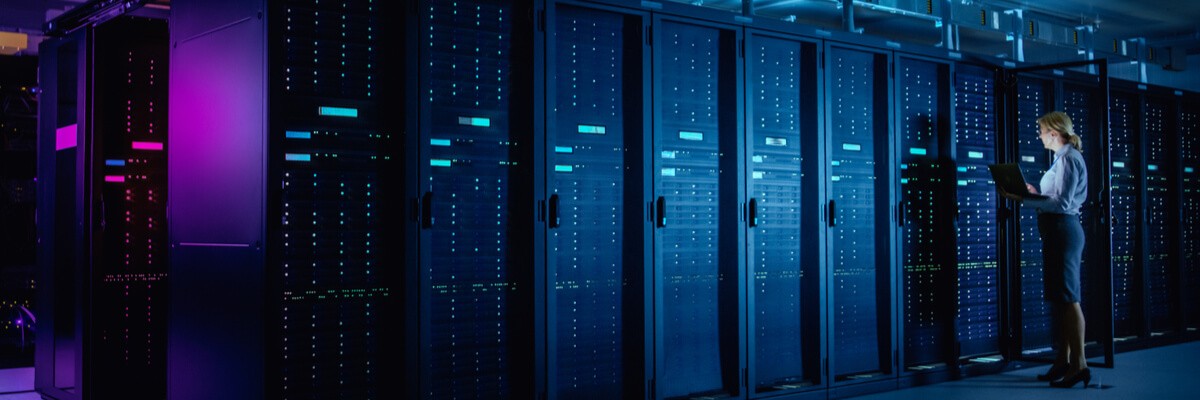Article More Than a Buzzword: Why Business Needs the Intelligent Edge
Learn how the intelligent edge enables companies to leverage AI and real-time insights to enrich the customer experience, empower employees and optimize business practices.
By Insight Editor / 30 Apr 2021 / Topics: Artificial Intelligence (AI) Intelligent edge

Businesses have embraced IT for innovation due to an increasing need for mobility and user insights. As a result, we’ve seen eager adoption of advanced technologies like Artificial Intelligence (AI) and the Internet of Things (IoT). But while these technologies have a lot to offer, some limitations still exist. Even though companies have become adept at data collection, turning that data into actionable insights — and doing so quickly — is where most fall short. Enter the intelligent edge.
The intelligent edge is changing our relationship with data, transforming feedback into insights into action in real time, or near to it. The intelligent edge enables companies to leverage AI and real-time insights that enrich customer experiences, empower employees and optimize business practices — creating new revenue opportunities and competitive advantage.
Forrester’s 2021 “Build Integrated Technology Platforms To Accelerate Growth And Agility” report tells IT leaders in the intermediate phase of technology maturity, “In this stage of technology maturity, innovate with technology to serve customers across the entire customer lifecycle, mastering systems of engagement and insight.”1 This is precisely what the intelligent edge allows us to do.
Understanding the intelligent edge
What is the definition of the intelligent edge?
The intelligent edge is a conceptual term referring to on-premises systems that collect, process and act upon data. Typically used within IoT arrays, the intelligent edge uses edge computing to reduce response times, bandwidth needs and security risks. Since all these actions are taken on premises, the data does not need to be sent to the cloud or a data center to be processed.
In other words, the intelligent edge is any IT ecosystem that analyzes and applies data at or near the site where it is generated to improve efficiency and innovation.
Why the edge?
In Forrester’s Business Technographics Mobility Survey, 2020, participants were asked, “Which of the following do you believe are the biggest benefits to your organization’s using edge computing/technologies?” The top three responses are as follows:
- Flexibility to handle present and future artificial intelligence demands
- Collection and AI analysis of edge equipment help us empower our employees to drive higher and faster values
- Collecting input from mobile, IoT and other devices help us provide customers with real-time insights for greater values
In short, the rationale for adopting edge technology is the implementation of AI and Machine Learning (ML) for employee and customer insights in real time.
Intelligent edge technologies offer four key benefits
Edge technology enables users to leverage four distinct benefits to accomplish the above. First is faster actionability, due to real-time engagement with AI allowing remote response to feedback instantly or near-instantly. Next is functionality without internet connectivity. Since the data doesn’t need to go anywhere to be acted on, it can be leveraged for certain use cases even with no internet connection. Third, edge technology supports better data aggregation to the cloud, as bringing data closer to home allows users to optimize cloud use and ensure only what’s necessary lives in the cloud.
The fourth benefit may be surprising: Edge technology is often very cost-effective. With its ability to create substantial Return on Investment (ROI), coupled with lowering cost curves, edge computing is a game changer. The cost of computing, and more importantly, the expenses tied to bandwidth and intelligent technologies have all been lowering. These drops in expenditures are enabling the whole underlying cost structure of IT, meaning it’s becoming increasingly cost-effective to do things at the edge, at a very local level. Edge computing can also reduce IT costs by keeping cloud storage under control. When you analyze and assess what has to happen at the edge, you send (and store) only necessary data to the cloud or to your private cloud — all other extraneous data is immediately discarded.
How and where to leverage the intelligent edge
As edge enables more real-time intelligent decision-making, companies will begin to expand their cloud strategies to include IoT edge cloud, 5G mobile edge cloud and global network edge cloud. The interest is already there, and the use cases are there to prove it.
Examples of edge computing use cases
A host of previously existing technology has been enabling more actionable data insights for years, from IoT devices like drones, thermometers and sensors to operational technologies, image analytics, AI and ML, and more. With edge computing, these technologies become even more powerful. The immediacy with which edge computing enables insights to become actions is enabling radical results across all types of industries worldwide, for example:
Energy: Edge computing provides technicians with remote access to solar panels and wind turbines to gather critical data and instantly adjust to conditions.
Transportation: Edge computing enables automatic traffic responses from streetlights and message boards and makes it possible to conduct remote inspections of roadways and railways safely and without disruption of traffic.
Retail: Edge computing supports daily inventory checks, reducing manual labor and human error and improving the customer experience.
Globally, the intelligent edge is driving transformation across the entire spectrum of verticals, impacting business processes, health outcomes, community resources and more. Just a few of the industries in which we’re seeing incredible advancements in edge applications include:
- Agriculture: Smart farming, remote monitoring for waste reduction and sustainability
- Manufacturing: Factory networks, plant efficiency, asset monitoring
- Utilities: Remote access management, automation, substations
- Healthcare: Medical asset tracking, temperature tracking, patient monitoring, wayfinding
- Transportation: Roadways and intersections, rail, mass transit, airports
- Connected cities: Smart lighting, waste management, safety, security, public connectivity
Intelligent edge case studies
Insight has already completed work with several clients to help them adopt advanced edge technologies leveraging edge computing and IoT for business improvements and innovations. In one instance, a smart vaccine fridge is helping healthcare organizations save on human resources costs and reimbursements and prevent vaccine spoilage while supporting improved inventory management. In another, a railroad company wanted to enhance its maintenance process and improve rail safety for its workers, so our team helped create a drone-based computer vision solution using IoT edge processing to prioritize images that indicate the need for maintenance.
How to get started
Having a strategic and secure edge ecosystem protects and accelerates an organization’s ability to innovate. Partnering with an experienced solutions provider like Insight can help you discover what your organization’s unique intelligent edge could, and should, look like.
Partnering with Insight for your journey to the intelligent edge gives you expert resources for every stage of the process, from idea to Minimum Viable Product (MVP) to full-scale deployment.
- Envisioning workshops from Insight Cloud + Data Center Transformation (CDCT) can help you discover use cases, requirements and success criteria for productive pilot projects.
- Insight Labs can work with you to create secure images and processes for IoT edge devices and assist with integration with your monitoring and update systems.
- When it comes time for rollout, Insight’s Digital Innovation and Connected Workforce teams have all the resources to help you determine the scale of your production and facilitate deployment.
- And when your intelligent edge solutions are in full force, Insight’s teams offer a host of services for ongoing monitoring, administration and optimization.
1Build Integrated Technology Platforms To Accelerate Growth And Agility, Forrester Research, Inc., March 11, 2021.
2 Business Technographics® Mobility Survey, Forrester Research, Inc., July 2020.






